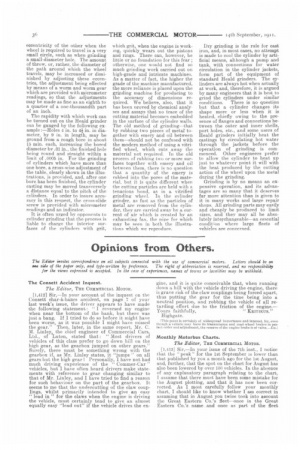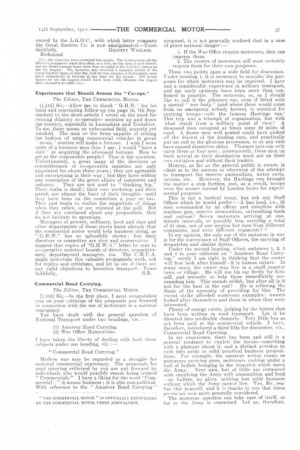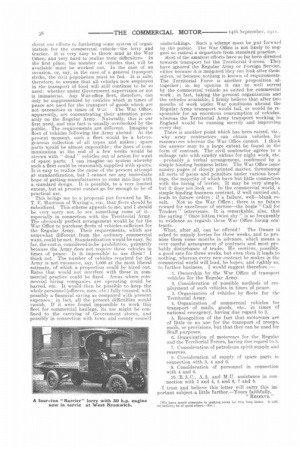Opinions from Others.
Page 16

Page 17

Page 18

If you've noticed an error in this article please click here to report it so we can fix it.
The Editor invites correspondence on all subjects connected with the use of commercial motors. Letters should be on me side of the Paper only, and type-written by preference. The right of abbreviation is reserved, and no responsibility
for the views expressed is accepted. In the case of experiences, names of towns or localities may be withheld.
The Consett Accident Inquest.
The Editor, THE COMMERCIAL MOTOR.
[1,412] Sir,—In your account of the inquest on the Consett char-A-banes accident, on page 7 of your last week's issue, the driver appears to have made the following statement: "I reversed my engine when near the bottom of the bank, but there was just a bang. if I tried to do so before it might have been worse, as it was possible I might have missed the gear." Then, later, in the same report, Mr. C. M. Linley, the chief engineer of Commercial Cars, Ltd., of -Luton, stated that : "Most drivers of vehicles of this class prefer to go down hill on the high gear, as the gearbox jumped on other gears." Surely, there must be something wrong with the gearbox if, as Mr. Linley states, it "illIfiDs " on all gears hut the high gear 1 Personally, I have not had much driving experience of the " Commer-Car " vehicles, but I have often heard drivers make statements with reference to gear changing similar to that of Mr. Linley, and I have tried to find a reason for such behaviour on the part of the gearbox. It seems to me that the undercutting of the claw couplings, whilst primarily intended to give an easy "lead in" for the claws when the engine is driving the vehicle, must certainly tend to give an almost equally easy "lead out" if the vehicle drives the en gine, and it is quite conceivable that, when running down a hill with the vehicle driving the engine, there is grave risk of the claw couplings being forced apart, thus putting the gear for the time being into a neutral position, and robbing the vehicle of all retarding effort due to the friction of the engine.—
Yours faith fully, " KRITIKUS." Highgate.
fThis point is certainly of widespread importance and interest, for, even though a vehicle may have its transmission and road-wheel brakes in per. Feet order end adjustment, the reserve of the engine brake is of valne._Ea.
Monthly Motorbus Charts.
The Editor, THE COMMERCIAL MOTOR.
[1,413] Sir,—In your issue of the 7th inst., I notice that the " peak " for the 1st September is lower than that published by you a month ago for the 1st August, and, further, that the spot on the chart for August has also been lowered by over 100 vehicles. In the absence of any explanatory paragraph relating to the chart,
assume that there must have been some mistake for the August plotting, and that it has now been corrected. As I most carefully follow your monthly chart, I should like to know whether I am correct in assuming that in August you twice took into account the Great Eastern Co.'s fleet—once in the Great Eastern Co.'s name and once as part of the fleet
owned by the L.G.O.C., with which latter company the Great Eastern Co. is now amalgamated.—Yours faithfully, GEOFERY WALLACE. Richmond.
the chart has been corrected this month. The returns from all the different companies reach this office, as a ,-ale, on the first of each month, and the Great Eastern bases were first included in the I..G.O.C. return on the lit August. We, however, also received a separate return of the Great Eastern buses on that day, arid the two returns, unfortunately, were taken oollectively in arriving at the total for the month. The actual figures for the lit August should have been 1,552, whereas the August chart showed it as 1,0(i5.—En.] Experiences that Should Arouse the "Co-ops."
The Editor, THE COMMERCIAL MOTOR.
[1,414] Sir,—Allow me to thank " G.H.W." for his lucid and convincing follow-up (on page 16, 7th September) to the short article I wrote on the need for rousing dilatory co-operative societies up and down the country, especially in Lancashire and Yorkshire. To me, there seems an unbounded field, scarcely yet touched. The man or the firms capable of setting the fashion of using commercial vehicles in great co-op." centres will make a fortune. I wish I were more of a, business man than I am: I would "have a iillot " at acquiring the aforesaid fortune. How to get at the responsible people? That is the question. Unfortunately, a great, many of the directors or committeemen of co-operative societies are only appointed for about three years 3 they are agreeable and enterprising in their way ; but they have seldom any conception of the great affairs of commerce and
industry. They are not used to " thinking big." Their realm is small ; their own workshop and their parish are almost the limit of their thoughtsuntil they have been on the committee a year or two They just begin to realize the magnitude of things when they retire, or are rejected at the poll. But if they are convinced about any proposition, they do not hesitate to speculate.
Managers of grocery, millinery, boot and shoe and other departments of these stores know already that the commercial motor would help business along, as " G.H.W." has so splendidly shown ; but their directors or committee are filow and conservative. I suggest that copies of "G.H.W.'s " letter be sent to co-operative societies' boards of directors, committeemen, departmental managers, etc. The C.M.IT.A. might undertake this valuable propaganda work, ask for replies and criticisms, and let us see if there are any valid objections to horseless transport.-Yours faithfully, Commercial Road Carrying.
The Editor, THE COMMERCIAL Moron.
[1,415] Sir,—In the first place, I must congratulate you on your criticism of the proposals put forward in connection with the use of motorcars in a national emergency.
You have dealt with the general question of National Transport under two headings, viz. :-- (1) Amateur Road Carrying.
(2) War Office Mannerisms.
T have taken the liberty of dealing with both these subjects under one heading, viz. :—
"Commercial Road Carrying."
Modern war may be regarded as a. struggle for national commercial supremacy. The proposals for road carrying criticised by you are put forward by individuals who would possibly resent being termed "Commercials." I have a liking for the word "Commercial : "It means business; it is also non-political. With reference to the " Amateur Road Carrying"
proposal, it is not generally realized that in a. case of grave national danger :— . I. If the War Office require motorcars, they can impress them.
2. The owners of motorcars will most certainly require them for their own purposes.
_These two points open a wide field for discussion. -Under heading 1, it is necessary to consider the purposes for which motorcars may be required. I have had a considerable experience in military transport, and my early opinions have been more than confirmed in practice. The motorcar, or, as I should like to call it the pleasure ear, even if fitted with a special " war body " (and where these would come from on emergency nobody knows), is unsuited for carrying troops—ride the famous Hastings run! This trip was a triumph of organization, but with what result from a military point of view A thousand men occupied at times some 20 miles of road. A dozen men well posted could have picked off the drivers of the leading cars, and practically put an end to the glorious procession, or at any rate have caused disastrous delay. Pleasure cars can only carry three or four men ; consequently, these men on their arrival at their destination must act on their own initiative and without their leaders.
History, as far as the general public is aware, is silent as to the success or otherwise of the attempt to transport the reserve ammunition, water carts,
rations, etc. However, the Hastings run brought the matter a step further, and, as a result, troops were the sooner earned by Loudon buses for experimental purposes. This is not a tactical essay, but ask any Staff Officer which he would prefer :—A bus load, i.e.,.25 men commanded by an officer and complete with machine sun, reserve ammunition, entrenching tools and rations ? Seven motorcars arriving at oneminute Intervals, or possibly less, carrying a total of 2,1 men, not of one section but men from different companies, and even different regiments? l• . In my opinion, the only use of the motorcar in war is for the conveyance of .Staff Officers, the carrying of despatches and similar duties. Under the second heading, which embraces 1, 2, 3 and 4 in your editorial on " Amateur Road Carrying," surely I am right in thinking that the owner will first look after himself—it is human nature. In many eases, the owner may live in a small country town or village. He will use his ear firstly for himself, and secondly to help those immediately surrounding him. This sounds selfish, but after all is it not for the best in the end? He is relieving the State of the necessity of providing for him. The recent. strike afforded numerous examples : owners looked after themselves and those in whom they were interested.
Plenty of energy exists, judging by the letters that have been written re road transport. . Let it be directed into profitable channels. Very little has as yet been said re the commercial vehicle. I have, therefore, introduced a third title for discussion, viz., Commercial Road Carrying. In my experience, there, has been and still is a general tendency to exploit the heroic—something with a glamour about it, and .a distinct aversion to rush into print re solid. practical business propositions. For example, the amateur writes reams re motorcars carrying guns, motorcars rushing under a hail of bullets bringing in the despatch which saves the Army. Very nice, but of little use compared with supnlying the Army with ammunition and food —no bullets. no glory, nothing but solid business without which the Army cannot live. Von, Sir, realise this yourself, and it is thanks to you that these poTits are now more generally considered.
Themotorcar. question can take care .of itself,. so far as the Army is concerned. Let us, therefore,
direct our efforts to furthering some system of organization for the commercial vehicle—the lorry and tractor. It is very easy to throw mud at the War Office, and very hard to realize their difficulties. in the first place, the number of vehicles that will be available must be worked out. In the case of an invasion, or, say, in the case of a general transport strike, the civil population must be fed. It is safe, therefore, to assume that all vehicles now employed in the transport of food will still continue to be so used : whether under Government supervision or not is immaterial. Any War-office fleet, therefore, can only be supplemented by vehicles which in times of peace are used for the transport of goods which are not necessities in times of War. The War Unice, apparently, are concentrating their attention primarily on the Regular Army. Naturally, this is our first need, and this fact is usually overlooked by the public. The requirements are different. Imagine a fleet of vehicles following the Army abroad. At the present moment, such a fleet would be a heterogeneous collection of all types and makes ; spare parts vould be almost impossible ; the lines of communication at the end of a few weeks would be strewn with " dead " vehicles out of action for want of spare parts. I can imagine no system whereby such a fleet could be reasonably supplied with spares. It is easy to realize the cause of the present attempt at standardization, but I cannot see any immediate hope of getting manufacturers to come into line with a standard design. It is possible, to a very limited extent, but at present cannot go far enough to be of practical use. This brings me to a proposal put forward by Mr. T. E. Harrison of Waring's, viz., that fleets should be subsidized. This scheme appeals to me, and I should be very sorry not to see something come of it especially in connection with the Territorial Army. The obviously perfect arrangement would be for the War Office to purchase fleets of vehicles sufficient for the Regular Army. Their requirements, which are somewhat different from the ordinary commercial want, could be met. Standardization would be easy. So far, the cost is considered to be prohibitive, primarily because the Army does not require these vehicles in times of peace. Is it impossible to use them ? I think not. The number of vehicles required for the Army is not excessive, say, 1,000 at the most liberal estimate, of which a proportion could be hired out. Rates that would not interfere with those in commercial practice could be fixed. Areas where commercial hiring companies are operating could be barred, etc. It would then be possible to keep the whole personnel (officers, men, etc.) fully trained, with possibly a financial saving as compared with present expenses in fact, all the present difficulties would vanish. If it were found impossible to work this fleet for commercial haulage, its use might be confined to the carrying of Government stores, and possibly in connection with town and county council
undertakings. Such a scheme must be put forward by the public. The War Office is not likely to suggest so radical a departure from standard practice. Most of the amateur efforts have so far been directed towards transport for the Territorial Forces. They have ignored the Regular Army or foreign Service, either because it is imagined they can look after them selves, or because nothing is known of requirements. The Territorial Force is another proposition al
together ; in my opinion it can be well served by the commercial vehicle as suited for commercial work ; in fact, taking the present organization and the vehicles available, I firmly believe that after two months of work under War conditions abroad the Regular Army transport wourd fail, or would be responsible for an enormous consumption of vehicles, whereas the Territorial Army transport working. in England would be running merrily and improving every day. There is another point which has been raised, viz., why army contractors can obtain vehicles for manoeuvres whereas the War Office cannot. I think the answer may to a large extent be found in the form of contract. The civil contractor agrees to a mileage rate with sundry extras for night work, etc. probably a verbal arrangement, confirmed by a simple binding business letter. The War Office issue sundry pages of closely printed matter, threatening 01 sorts of pains and penalties under various headings, the majority of which have but little connection with the hiring of lorries. It may be very simple, but it does not look so. In the commercial world, a simple binding business contract, if well carried out, leads to future orders ; if a failure, well—blank re
sult, Not so the War Office ; there is no future reward for excellence of service—the bogie "Call for Tenders" intervenes. It is remarkable, also, that the saying " Once bitten twice shy " is so frequently in evidence as regards these War Office hiring contracts, What, after all, can be offered? The Owner is asked to supply lorries for three weeks, and to promise them some months in advance, which means a very careful arrangement of contracts and most probably disturbance of trade. He receives, possibly, a, good rate for three weeks, but even then it leads tor nothing, whereas every new contract he makes in the commercial world will lead, he hopes, and rightly so, to further business. I would suggest therefore :— 1. Ownership by the War Office of transport vehicles for the Regular Army.
2. Consideration of possible methods of employment of such vehicles in times of peace.
3. Organization of vehicles by fleets for the Territorial Army.
4. Organization of commercial vehicles for transport of mails, goods, etc., in times of national emergency, having due regard to 3.
5. Recognition of the fact that motorcars are of little or no use for the transport of troops, mails, or provisions, but that they can be used for Staff purposes.
6. Organization of motorcars for the Regular and the Territorial Forces, having due regard to 5.
7. Consideration of petroleum spirit supply and reserves.
8. Consideration of supply of spare parts in connection with 3, 4 and 6.
9. Consideration of personnel in connection with 4 and 6.
10. R.A.C., A.A. and M.U. assistance in connection with 3 and 4, 5 and 6, 7 and B.
I trust and believe this letter will carry this important subject a. little further.—Yours faithfully,
" RESERVE."




















